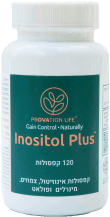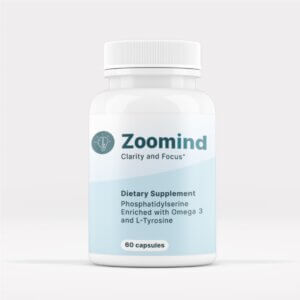 In this article, I am going to explain the role of the compound known as inositol in restoring fertility for women with Polycystic Ovary Syndrome (PCOS) and go deeper into how it represents a natural approach to achieving proper hormonal balance and alleviating PCOS symptoms.
In this article, I am going to explain the role of the compound known as inositol in restoring fertility for women with Polycystic Ovary Syndrome (PCOS) and go deeper into how it represents a natural approach to achieving proper hormonal balance and alleviating PCOS symptoms.
With growing research supporting its benefits, inositol introduces a promising alternative to more aggressive treatments for PCOS. Its ability to address both hormonal and metabolic imbalances makes it a powerful tool in managing this complex condition, offering hope to women seeking a natural and effective solution.
For women struggling with PCOS symptoms, inositol supplements such as Inositol Plus offer a natural and effective way to restore hormonal balance, improve insulin sensitivity, and support overall reproductive health.
By combining myo-inositol and d-chiro-inositol with several essential dietary elements and combining them with a well-balanced diet and healthy lifestyle, many women can significantly improve their menstrual cycles, metabolic health, and even mental well-being. Whether you’re trying to conceive or simply looking to manage your PCOS symptoms better, Inositol Plus could be the missing piece on your path to complete well-being.
Understanding PCOS and its impact on fertility
Polycystic Ovary Syndrome (PCOS) is a hormonal disorder that affects millions of women worldwide, often leading to irregular menstrual cycles, difficulty conceiving, and metabolic complications. The roots of PCOS lie in an imbalance of reproductive hormones, particularly elevated levels of androgens (male hormones) that disrupt normal ovulation. This hormonal disturbance can also contribute to insulin resistance, high blood sugar levels, and an increased risk of type 2 diabetes and cardiovascular diseases.
PCOS symptoms extend beyond fertility issues. Many women with the condition experience weight gain, excessive hair growth (hirsutism), acne, and even mental health challenges such as anxiety and depression.
Based on the latest medical guidelines, PCOS is diagnosed using the Rotterdam criteria. This means a doctor will diagnose PCOS if a woman has at least two out of three key signs:
- Irregular periods or no periods at all (a sign of ovulation problems).
- High levels of male hormones (androgens), which can cause symptoms like acne, excess facial or body hair, or hair thinning on the scalp.
- Polycystic ovaries seen on an ultrasound, meaning the ovaries have many small fluid-filled sacs (cysts), but these are not the same as typical ovarian cysts.
Not every woman with PCOS will have all three symptoms, and the condition can look different from person to person. A doctor will check for these signs through a mix of medical history, hormone tests, and ultrasound scans.
In turn, addressing PCOS requires a patient-specific approach that targets hormone regulation, metabolic balance, and overall well-being.
In recent years, researchers have turned their attention to inositol, a naturally occurring compound that plays a crucial role in cellular signaling and metabolic functions. Inositol has gained recognition for its potential to restore hormonal balance, improve insulin sensitivity, and enhance fertility in women with PCOS.
What is Inositol?

One specific form, inositol hexaphosphate (IP6), has also been studied for its potential benefits in managing hormonal imbalances and metabolic syndromes, particularly in postmenopausal women with metabolic syndrome. By improving insulin sensitivity and reducing oxidative stress, inositol supplements can play a key role in managing PCOS symptoms and enhancing overall well-being.
How Inositol helps women with PCOS symptoms
Restoring Hormonal Balance
Myo-inositol has been shown to improve ovarian function and promote regular menstrual cycles in women with PCOS. Reducing excessive androgen levels helps regulate the hormonal environment needed for ovulation, increasing the chances of conception. Inositol Plus supplement has even been associated with improved egg quality, which is particularly valuable for women undergoing fertility treatments.
Improving insulin sensitivity
Many women with PCOS experience insulin resistance, which can lead to high blood sugar levels, weight gain, and an increased risk of developing type 2 diabetes. Inositol Plus enhances insulin signaling, reducing the body’s need for excessive insulin production and helping stabilize glucose levels. This improvement in insulin function can directly impact weight management, as it prevents the excess insulin-driven fat storage that many women with PCOS struggle with.
Supporting cardiovascular health
PCOS is associated with an increased risk of cardiovascular issues due to elevated cholesterol levels and chronic inflammation. Inositol Plus, with its supporting nutrients of chromium, cinnamon, magnesium, potassium, and red yeast, can help regulate cholesterol and improve heart health. Turmeric (curcumin), another valuable ingredient in Inositol Plus, has well-known anti-inflammatory properties that support cardiovascular function and overall metabolic balance.
Reducing anxiety and panic attacks
Beyond its metabolic benefits, inositol has been explored for its role in mental health. It has been linked to improvements in anxiety disorders and panic attacks, potentially offering additional relief for women who experience emotional distress as part of their PCOS symptoms. Studies about inositol have shown that inositol can positively influence neurotransmitter activity, particularly serotonin, which plays a role in mood regulation.
Inositol Plus: What’s inside?
Inositol Plus is a patented capsule that provides the most effective solution for PCOS. It combines myo-inositol and d-chiro-inositol with other essential nutrients that synergize to enhance their effects. The scientifically formulated Inositol Plus supplement includes:
- Myo-inositol. This is the primary form of inositol used in PCOS treatments and is essential for hormone regulation and insulin sensitivity.
- D-chiro-inositol. It works synergistically with myo-inositol to promote ovulation and metabolic balance.
- Chromium enhances insulin function and supports glucose metabolism.
- Cinnamon is known for its ability to help lower blood sugar and improve insulin sensitivity.
- Magnesium and potassium are essential for glucose metabolism and cardiovascular health.
- Zinc plays a role in reducing excessive androgen levels in PCOS.
- Folic acid supports reproductive health and is particularly beneficial for women trying to conceive.
- Coenzyme Q10 (CoQ10) is an antioxidant that improves egg quality, particularly in women undergoing fertility treatments.
- Turmeric offers anti-inflammatory benefits, helping to manage chronic inflammation in PCOS.
- Red Yeast contains compounds that may help lower cholesterol levels.
Dosage and safety
For best results, the recommended dosage of Inositol Plus is one capsule each morning with food. Inositol supplements are generally safe, with no significant side effects reported. However, it is always advisable to consult a healthcare provider before starting any new supplement, especially for women with underlying health conditions.
Common questions about Inositol
Is Inositol Plus useful only for women with PCOS symptoms?
No, inositol has benefits beyond PCOS. It can help with insulin resistance, mental health conditions such as anxiety, and metabolic syndromes in postmenopausal women. Some research also suggests its role in supporting brain health and cognitive function.
What happens when you start taking inositol?
Many women report improved menstrual regularity, reduced cravings, better mood, and increased energy levels within a few weeks of starting inositol supplements.
What does a PCOS belly look like?
PCOS-related weight gain often leads to an accumulation of fat around the abdomen, creating a rounded or bloated appearance. This is due to insulin resistance, which promotes fat storage in the midsection.
Can inositol cause weight gain? / Has anyone lost weight with inositol?
Inositol is more likely to support weight loss by improving insulin sensitivity, reducing cravings, and stabilizing blood sugar levels. Many women with PCOS have reported weight loss as a secondary benefit of taking Inositol Plus.
What does Inositol Plus do to cortisol?
Inositol may help regulate cortisol, the stress hormone, which can be beneficial for women with PCOS who often experience heightened stress levels and adrenal imbalances.
Can inositol lower estrogen too much?
Inositol primarily targets androgen and insulin regulation rather than estrogen. However, balancing these hormones can naturally support overall hormonal stability without significantly lowering estrogen levels.
When should I take Inositol Plus, morning or night?
It is generally recommended that inositol be taken in the morning with food for optimal absorption and metabolic support throughout the day.
What does inositol do for the female body?
Inositol plays a vital role in regulating hormones, improving insulin sensitivity, supporting ovarian function, and enhancing mental well-being.
Can inositol be used alongside fertility treatments?
Yes, many women undergoing fertility treatments like IVF take inositol supplements to improve egg quality and enhance their chances of conception.
What are the symptoms of inositol deficiency?
Symptoms of inositol deficiency may include mood disorders, fatigue, high cholesterol, insulin resistance, and hormonal imbalances.
Who should not take inositol?
Inositol Plus can be bought from us over the counter without a prescription. However, while the ingredients are safe for most people, those with low blood sugar issues, bipolar disorder, or who are taking medications for diabetes should consult a healthcare professional before taking it.
Is inositol good for hair?
Yes! Inositol supports hair growth by improving hormone balance and reducing excess androgens, which can contribute to hair thinning in women with PCOS.






